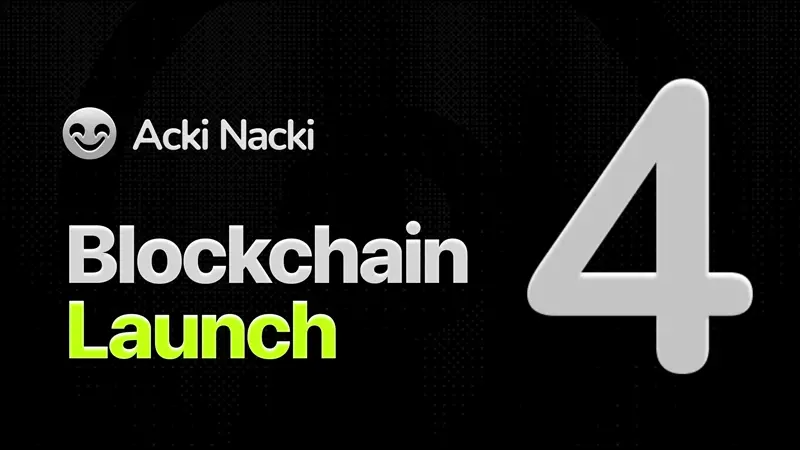In 2009, Bitcoin cracked the code: the world’s first public money that worked without a bank, company, or government in the middle. It proved you could send value to anyone on Earth using nothing more than an internet connection.
That alone was revolutionary.
Until then, paying someone remotely meant going through a private ledger owned by someone else, a bank, PayPal, a card processor. Bitcoin replaced that with one open ledger, the blockchain, where anyone could create an address for free and start transacting.
It wasn’t perfect. It still isn’t. But the genius was in the fact that it worked at all, without trusted intermediaries. Like email in the ’70s, it was clunky, niche, and misunderstood, but destined to reshape the map.
If Bitcoin was the proof-of-concept for public money, Acki Nacki is the next iteration: a blockchain designed to make the idea practical, fast, and ready for the kind of internet we actually live on now.
Where Bitcoin showed it was possible, Acki Nacki asks: What if this was smooth enough for millions of people to use every day, without noticing they were on a blockchain at all?
Its engine is a probabilistic proof-of-stake protocol built for fast finality and parallel execution.
That means transactions confirm quickly, and the network can process a ton at once, without the gas fees and bottlenecks that plague older chains.
Instead of everyone waiting in the same checkout line, it’s like having dozens of parallel lanes open at the same time.
Why does this matter?
Because blockchains won’t replace private choke points if they can’t match the speed and user experience of the systems they’re replacing.
If you want to run games, marketplaces, payments, and IoT on public infrastructure, you can’t make people wait or pay per click. Acki Nacki is built to meet that bar.
The philosophy stays the same: no single point of failure.
The consensus committee is randomly chosen for every block, no predictable target for an attacker. Verification and block propagation are split, making coordinated attacks harder. And because it’s public, the doors stay open to everyone, no matter where they live or how much they own.
Bitcoin proved you could replace private payment rails with public ones. Acki Nacki extends that to the rest of our digital lives.
Payments without banks.
Games without corporate hosts pulling the plug.
IoT without a central server deciding if your device works today.
And it’s already in motion. Popit Games, built on Acki Nacki, is a living demo: competitive, rewarding, and fully on public rails.
The rules aren’t set by some gaming company that can nerf your progress or delete your account, they’re set by code, enforced by the network.
Is it perfect?
Define perfect? Let us be causios and say no.
Neither was the early internet, Bitcoin, or email. But the direction is right. If the internet gave everyone a printing press, and Bitcoin gave everyone a bank account,
Acki Nacki could be the high-speed, multiplayer, programmable infrastructure for the next generation of digital life, owned by no one, available to all.
We’ve already seen what happens when public infrastructure replaces private choke points.
The web broke the monopoly of a few broadcasters. Bitcoin cracked the monopoly of banks. Acki Nacki’s aim is to break the monopoly on the rest.
The rails are being built. The only question now is who’s ready to ride.
Real Talk
Look, I’ve been around the block. I’ve seen projects with whitepapers shinier than their code. I’ve watched people throw money into the next big thing, only to find out “next” meant “never.”
That’s not what this is.
This is the same idea that made Bitcoin worth fighting for, public rails, no middleman, but with the horsepower to actually run the stuff we use every day.
I’m not here to sell you dreams. I’m here to remind you of the simple math:
Private infrastructure = permission. Public infrastructure = possibility.
When the rails are public, anyone can build, anyone can join, anyone can leave. There’s no button some suit in a boardroom can press to lock you out. There’s no “sorry, that feature’s now premium.” There’s no algorithm deciding whether your transaction, your game, or your device is “appropriate.”
Bitcoin lit the fire. Acki Nacki is laying the tracks.
It’s not perfect, but neither was the first bicycle. We still rode it, fell off, scraped our knees, and kept going, because it was better than walking.
So here’s the deal: you can wait until the rails are full, the stations are crowded, and the tickets cost more. Or you can climb aboard while they’re still building the line.
Just remember, this train doesn’t stop for gatekeepers.





